Is Brioche an Enriched Dough? Find Out What Makes This French Favorite So Unique

What To Know
- The high fat content from the butter creates a flaky and tender crumb, while the eggs add richness and structure.
- Sugar is added to brioche dough to provide a slight sweetness and balance the richness of the butter and eggs.
- Yes, it is possible to make brioche without eggs, but it will result in a different texture and flavor.
Brioche, with its golden-brown crust and soft, fluffy interior, is a delectable bread that has captured the hearts of bread enthusiasts worldwide. But what sets brioche apart from other breads? Is it an enriched dough? In this in-depth blog post, we will delve into the world of brioche, exploring its ingredients, characteristics, and the answer to the question: is brioche an enriched dough?
What is Enriched Dough?
Before we delve into brioche, let’s define what an enriched dough is. Enriched doughs are those that contain ingredients beyond the basic flour, water, and yeast. These additional ingredients, such as butter, sugar, eggs, and milk, enhance the flavor, texture, and nutritional value of the bread.
Is Brioche an Enriched Dough?
Yes, brioche is an enriched dough. It contains a significant amount of butter, eggs, and milk, which contribute to its rich flavor, soft texture, and golden-brown crust. The high fat content from the butter creates a flaky and tender crumb, while the eggs add richness and structure. The milk provides moisture and enhances the flavor.
Characteristics of Brioche Dough
- High Fat Content: Brioche dough contains a high percentage of butter, typically ranging from 25% to 50%. This fat content gives brioche its characteristic flaky and tender texture.
- Eggs: Eggs are another essential ingredient in brioche dough, adding richness, structure, and color. The yolks contribute to the golden-brown crust, while the whites provide elasticity and strength.
- Milk: Milk is used to hydrate the dough and enhance its flavor. It also helps to tenderize the crumb and create a soft, moist texture.
- Sugar: Sugar is added to brioche dough to provide a slight sweetness and balance the richness of the butter and eggs.
- Yeast: Yeast is responsible for the fermentation process that creates the bubbles and gives brioche its characteristic light and airy texture.
Brioche vs. Other Enriched Doughs
While brioche is an enriched dough, it differs from other enriched doughs, such as challah and panettone. Challah is a Jewish bread characterized by its braided shape and slightly sweet flavor. Panettone is an Italian Christmas bread known for its tall, cylindrical shape and studded with candied fruit and nuts.
Uses of Brioche
Brioche is a versatile bread that can be used in various ways, including:
- Breakfast: Brioche is a popular choice for breakfast sandwiches, French toast, and pastries.
- Sandwiches: Its soft and flavorful texture makes brioche an excellent bread for sandwiches, both hot and cold.
- Desserts: Brioche can be used to make bread pudding, bread crumbs, and other sweet treats.
Wrap-Up: Brioche – The Quintessential Enriched Dough
In conclusion, brioche is indeed an enriched dough, characterized by its high fat content, eggs, milk, sugar, and yeast. Its rich flavor, soft texture, and golden-brown crust make it a beloved bread worldwide. Whether enjoyed for breakfast, sandwiches, or desserts, brioche is a culinary delight that embodies the essence of enriched doughs.
Questions We Hear a Lot
1. Can I make brioche without eggs?
Yes, it is possible to make brioche without eggs, but it will result in a different texture and flavor. The eggs contribute to the richness, structure, and color of brioche.
2. What is the best butter to use for brioche?
Unsalted butter is the best choice for brioche, as it allows you to control the salt content and prevent the bread from becoming too salty.
3. How can I make sure my brioche is light and fluffy?
Proper kneading and fermentation are crucial for achieving a light and fluffy brioche. Knead the dough thoroughly to develop gluten and allow it to rise in a warm place for several hours.
4. Can I freeze brioche?
Yes, brioche can be frozen for up to 3 months. Wrap it tightly in plastic wrap and place it in an airtight container before freezing.
5. What is the difference between brioche and croissant dough?
Croissant dough contains a higher percentage of butter and is laminated, which creates its flaky, layered texture. Brioche dough has a lower butter content and is not laminated.





